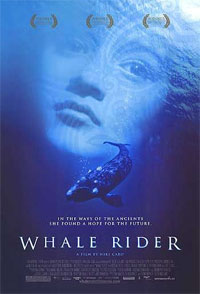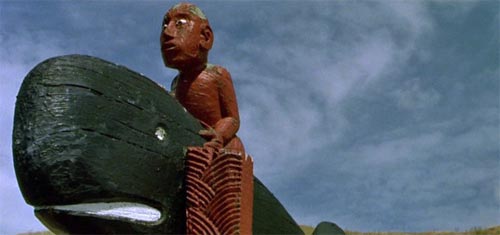Whale Rider: The Moana of New Zealand

When I first saw the title "Whale Rider" I thought to
myself: Oh? Maybe it had something to do with saving whales? Like Free Willy?
Turns out, the film is a lot
more than just saving whales.
Whale Rider is a New Zealand
German family drama film based on the novel of the same name written by Witi Ihimaera. The
plot of this film is about a little girl from the Maori tribe in New Zealand
named Paikea (nicknamed "Pai") who wishes to be the new chief of her
tribe and the challenges she must face to achieve her goal; which included
challenging gender norms, enduring prejudice and saving beached humpback
whales.

The Maori tribe originated from Eastern Polynesia, where their
ancestor rode the first whale from Hawaiki, the original home of Polynesians,
to New Zealand. Whales had been part of their culture for a very long time, as
this animal had been their primary food source. Maori people revered whales so
much that the motifs of this animal could be seen everywhere in their buildings
and monuments. There are some legends among the tribe stated that whales are
the descendants of the sea god Tangaroa. Interestingly enough, the main
character's name "Paikea" is also the name for "southern
humpback whale" in the old Maori language, the same species of whale that
must be saved in the climax off the film.

While this film is very similar
to the Disney animated feature film Moana, as both shared themes of Polynesian culture with a female main character, the message both films provided were somewhat
different. While the main themes of Moana are about identity acceptance and self-actualization;
Whale Rider teaches the avoidance off gender prejudice and acceptance of
changing gender norms.
In Whale Rider, Paikea is the namesake and direct
descendant of the ancestor who rode the first whale, also known as the whale rider.
She had a twin brother who died at childbirth along with their mother, which
displeased her grandfather as the twin brother was his best candidate for the
next chief of the tribe. When Pai showed interest in becoming chief, going so
far to secretly learn the traditional dances, songs and martial arts, she was
reprimanded for it upon being found out by her grandfather, as the chief
must be male in accordance to their sacred traditions.

This film also showed an aspect
of social psychology in the form of psycho-social development, a theory by Erik
Erikson (1998) which proposed that as we psychologically develop, we will face
crisis's that needs be resolved to proceed to the next stage of development.
The stage of development shown in the film is the identity versus role
confusion stage, which begins at the age of 12, where a personal identity is
being explored and developed, and success comes with the acceptance of one's
own identity and failure comes with confusion of one’s own role in the social
context. Paikea identified herself as the new leader for her tribe, and despite
all odds mastered every skill required to be a chief. Not only did she mastered
the art of taiaha (martial art involving the usage of a staff) designated for male
chiefs, she even completed the final test that all the other candidates for the
next chief failed: retrieving the rei puta (whale tooth necklace) that her
grandfather tossed into the sea.
Despite her grandfather's scolding and the
traditional gender norms of being a chief, she persevered and stayed true to
her identity as the new leader of her tribe. At the end of the film, which
involved saving beached southern humpback whales and falling into a coma due to
her riding a whale and almost died of drowning, she finally managed to change
her grandfather's mind and became the rightful new leader of the Maori
people. At this point, the message of the film could not had been clearer: no matter what gender you are, as long as you’re competent and full of perseverance, you can succeed in life.
Overall, this film is a wonderful,
informative classic. With an engaging plot, good special effects and decent acting; it provided the audience knowledge regarding the unique culture of
the Maori Tribe of New Zealand and the message of gender equality. If you like films with wholesome plots and rich cultural themes, this is the film for you!
Haami, B. (2006). 'Te whānau
puha – whales - Whales in Māori tradition', Te
Ara - the Encyclopedia of New Zealand,
http://www.TeAra.govt.nz/en/te-whanau-puha-whales/page-1
Erikson, E. H. & Erikson, J.
M. (1998). The Life Cycle Completed. New York: Norton.
Comments
Post a Comment